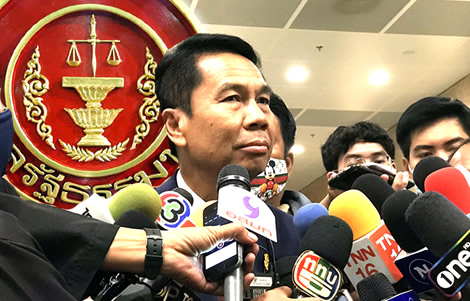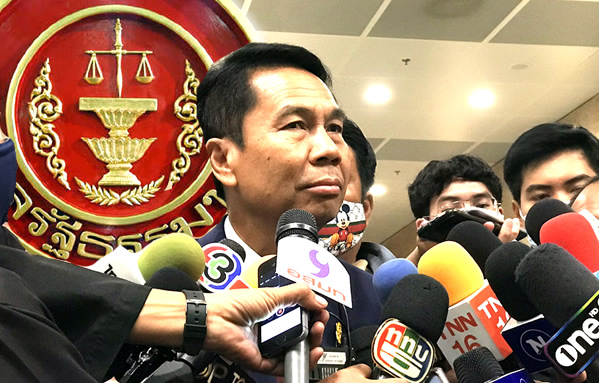The Pheu Thai Party won zero party list seats in the 2019 General Election with 21.9% of the vote, seats that ultimately, due to the single ballot system with a divisor of 500, were awarded to smaller political parties. Based on its vote share, it should have won at least 30 extra party list seats.
The Pheu Thai Party MP for Maha Sarakham and opposition chief whip, on Friday, told the press that next Wednesday’s decision from the Constitutional Court may be one of historic importance for democracy and the way forward for politics in Thailand. Sutin Klangsaeng said that a green light from the court on the legality of the organic electoral law, approved by parliament in August, would pave the way for a successful General Election next year with a fair electoral system while also going far to remove the grounds for protesting against the next democratically elected government. He predicted the alternative decision by the court to reject the law would leave Thailand navigating a difficult and darker path that lawmakers would find extremely challenging.

The Constitutional Court will rule on Wednesday 30th November on whether the electoral law passed in August, in controversial circumstances without a quorum, in its original draft form, is illegal or not following a petition by 105 MPs, mainly from smaller parties in the House of Representatives who stand to be wiped out of the new voting and seat allocation system for General Elections come into force.
The review by the Constitutional Court is being undertaken under Section 91 and 94 of the 2017 Constitution and refers to Section 25 and 26 of the new law.
Key to the bill before the court is the allocation system for 100 party list seats in parliament nationally with larger parties gaining from the new law
The proponents of the bill such as the Pheu Thai Party see the new voting system with two ballots, one for constituency MPs and the other for list MPs, combined with a divisor of 100 against the national vote tally to determine a quota for the number of votes needed for a political party to be awarded a list seat as simply fair play. The provision would redress the loss suffered by the country’s largest party in the 2019 General Election.
In the March 2019 poll, Pheu Thai received no party list seats at all despite attaining nearly 22% of votes cast.
This effectively denied the Pheu Thai Party at least 30 of the 150 party list seats up for grabs in the last General Election and transferred those seats to smaller parties thereby fragmenting the eventual makeup of the House of Representatives.
Sources speculate December 24th is a key date being considered to dissolve the House of Representatives
The failure of the new electoral law before the Constitutional Court risks a return to this sort of situation if, for instance, an executive decree is issued to regulate the voting and electoral process for the next poll which sticks to the original formula used in 2019 on the grounds of expediency with such a short time to go before the election is called.
On Friday, the Pheu Thai Party Chief Whip and MP for Maha Sarakham, Mr Sutin Klangsaeng told the media that the decision by the court next week will have a decisive impact on the future of politics and democracy in Thailand.
Electoral law approved by unanimous decision this week ushering in more liberal party membership rules
The ruling will come just one week after the court approved another political law sent for its consideration based on the eligibility for membership of political parties where judges ruled in a nine to zero unanimous decision, to approve a law which reduced party membership fees and gave parties more discretion to admit members even where they have been charged with crimes such as human trafficking and money laundering if the individuals concerned have not been convicted.
Deputy Prime Minister Wissanu Krea-ngam welcomed the court’s decision and indicated he was not surprised but expressed less confidence about the fate of the second electoral law to do with the voting procedure and calculations of party list seats.
On Friday, Pheu Thai’s Sutin Klangsaeng said if the law is approved by the court then the vista for Thailand’s democracy will be open.
He compared it to a wide open road on which politics and democratic life can move forward.
Rejection of the proposed electoral law would leave Thai politics on a more difficult and darker path just before a General Election is due to be called
A decision to nullify the new electoral law and effectively send it back to a destabilised House of Representatives, currently on the cusp of an election with a limited life span left, would leave the future of politics in Thailand on a narrow and difficult pathway.
Mr Sutin warned that for the body politic to deal with a rejection of the law will not be easy and said this would depend on the grounds specified by the court if the organic electoral law is rejected.
He said that amending the constitution would be a difficult task while even reaching an agreement on a new electoral law, at this time, would also be an uphill struggle.
He insisted, on the other hand, that if the electoral law was approved by the court, it would offer Thailand a clear path to the next General Election with a fair electoral process to obtain a general mandate from the people.
He emphasised that this would bring an end to protests challenging the authority of any new government that may emerge after the next poll.
Join the Thai News forum, follow Thai Examiner on Facebook here
Receive all our stories as they come out on Telegram here
Follow Thai Examiner here
Further reading:
Uncertain politics ahead as PM reported to be planning to dissolve the House of Representatives
Pheu Thai looking at property developer tycoon Srettha for PM role after next General Election
Possible Pheu Thai PM Paetongtarn Shinawatra promises a new society where everyone is secure
Drugs to be an election issue as Anutin digs in insisting that attitudes must change on cannabis
Prime Minister Prayut Chan ocha reinstated by the Thai Constitutional Court in a majority verdict
Election law finalised in parliament but the basis for the next General Election is still uncertain
Prayut retains all the cards as Thailand may be pivoting back to a one-ballot election process
Senator warns that Paetongtarn Shinawatra or Ung Ing, Thaksin’s daughter, is wrong for the job
Legal pot does not appear to be working for Anutin’s Bhumjaithai Party in latest opinion poll
New Shinawatra may lead the next quest for power as Pheu Thai Party aims for 14 million members
Bad news for PM and Palang Pracharat in Bangkok on Sunday as resurgent Pheu Thai Party wins big
By-election polls amid a weak economy and rising food prices may mean a 2023 General Election
Move against Pheu Thai, the kingdom’s biggest political party, over it’s alleged links to Thaksin
About the Author
Carla Boonkong & Pranee O’ Connor
Carla Boonkong is a magazine writer who writes extensively about woman’s issues in Thailand. One of her key subjects is the story of Thailand’s growing influence in the world and the role played by Thai women in the process. She is now a staff writer with Thai Examiner.com in Bangkok. Son Nguyen is an international writer and news commentator specialising in Thai news and current affairs. He commenced working with the Thai Examiner News Desk in May 2018.

